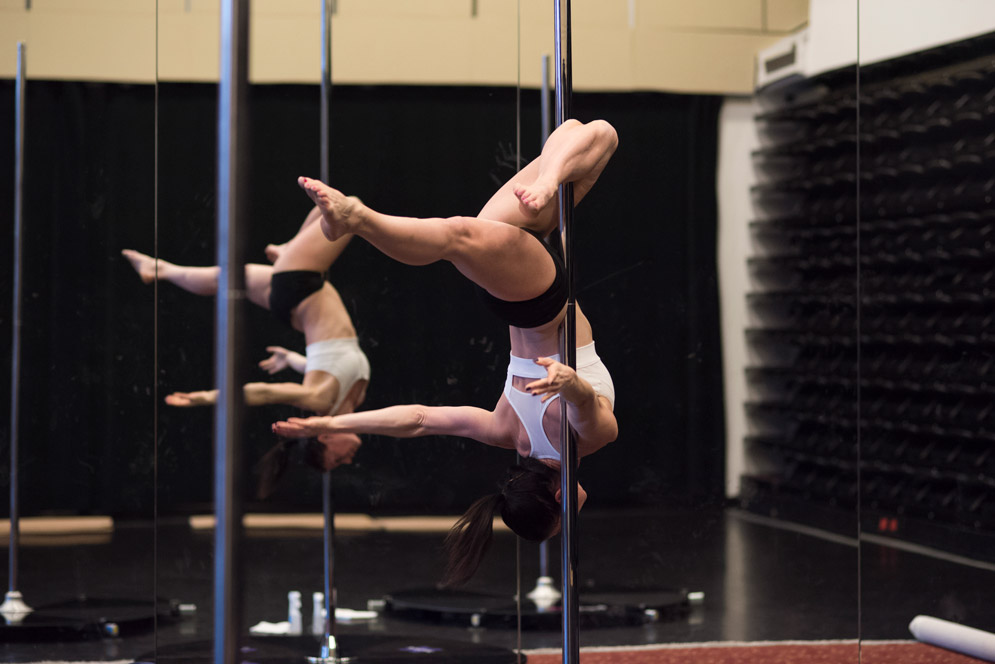Pole Dancing Comes to FitRec
Exercise class is fun—and a very serious workout

Professional dancer Liz Roncka (Sargent’95,’97) teaches a lyrical form of pole dancing that combines athleticism with dance at FitRec. Photo by Lexi Pline (COM’19)
For most people, pole dancing conjures up unsavory images fit for a Sopranos episode, so let’s get a few things out of the way.
BU’s Pole Dancing Circuit class was not intended to train a new generation of exotic dancers. This FitRec class was about fitness, and fun.
Micki Taylor-Pinney, BU dance program director, says the three-session not for credit class was created to introduce students to an increasingly popular form of exercise and self-expression, one that demands muscle strength, coordination, and flexibility.
“Pole dancing has had a certain image,” Taylor-Pinney acknowledges. “But more recently, it’s had a rebirth for fitness. So what we’re offering is a mix of dance and exercise, really not unlike aerial dance.”
It’s a workout whose popularity is growing both in the United States and abroad. Studios dedicated to pole dancing have cropped up in nearly every major American city, and international competitions abound. There’s even a nascent effort to make it an Olympic sport.
Taylor-Pinney says that students had requested a pole dancing class, so FitRec rolled out a pilot class this spring. The class was deemed so successful that Taylor-Pinney has scheduled four more sections during the summer. The four- or five-week-long classes will meet once a week and will be taught by modern and contemporary dancer and dance instructor Liz Roncka (Sargent’95,’97), who taught the pilot class.
Roncka says she became interested in aerial movement performed using ropes in the late 1990s as a professional dancer. She began studying pole dancing about four years ago as a means of fitness and artistic expression and eventually became certified to teach it.
Performing exotic moves in a safe place surrounded by supportive people is often part of pole’s appeal, and Roncka occasionally wowed observers during class with her aerial splits and other gravity-defying poses.
“Students are choosing pole for a reason,” she says. “Yes, they’re curious and it’s different because it’s aerial, but you also want to experience a more free and empowered version of yourself.”
During a recent class, Roncka walked students through complex maneuvers, helping them through sequences and challenging moves that left them suspended from the pole. Floor and barre work designed to build strength on the pole were also incorporated in the class.
Sticking to the pole is a requirement for most pole maneuvers, so the dress code for the class calls for exposed skin. Shorts may be no lower than mid-thigh and students need to wear a form-fitting top or sports bra. Using a moisturizer before class is a no-no, because it causes a dancer to slip.
Aerial dance student Allie Cole (CAS’21), who has studied trapeze since she was nine, says the class was a natural extension of her athletic interests. “I wanted to see what my skill level would be,” she says. “All the women who do it are so strong and they make it look so easy.”
The biology major says she learned that pole dancing is not easy, but it’s fun and a good strength-building workout. Sure, there were a couple of self-conscious moments, like executing a “body roll,” a maneuver that requires rolling your body like a wave with the pole at your back.
But her discomfiture was fleeting. “This is just a way to express yourself,” she says with a laugh. “Any style of dance is.”
Kayla Anderson (CAS’19), a member of the BU Ballroom Dance Club as well as the Women’s Rugby Football Club, says she took the class to try something new. A psychology major and dance and public health minor, she says she’s always looking for new physical activities.
“I’m an adventurous person,” she says. “And at the end of the day, it’s just entertainment.” In fact, she had already been to two pole dancing parties for friends’ birthdays and viewed the class as a way to explore it in a more structured way.
“You can show off a lot or a little. You can just make it about you,” she says. “You have that power to pick what you want to do with your body.”
Roncka says no men have signed up for the class so far. She would like to see men join in, she says, noting that the Indian practice of Mallakhamb, or suspended yoga using a pole, is performed primarily by men.
Megan Woolhouse can be reached at megwj@bu.edu.
Comments & Discussion
Boston University moderates comments to facilitate an informed, substantive, civil conversation. Abusive, profane, self-promotional, misleading, incoherent or off-topic comments will be rejected. Moderators are staffed during regular business hours (EST) and can only accept comments written in English. Statistics or facts must include a citation or a link to the citation.